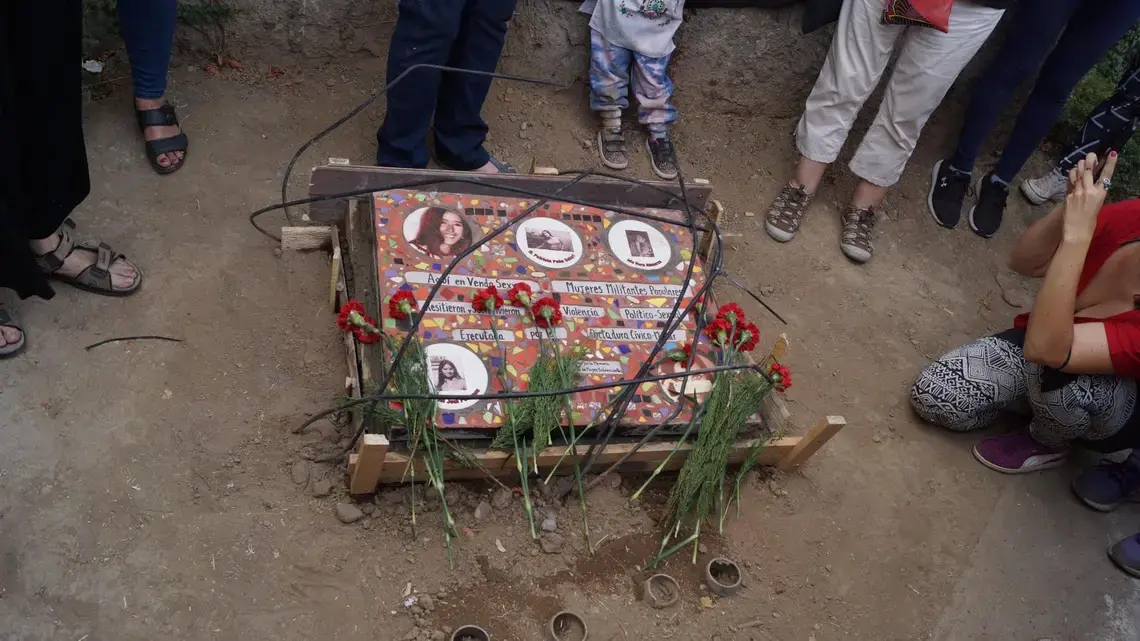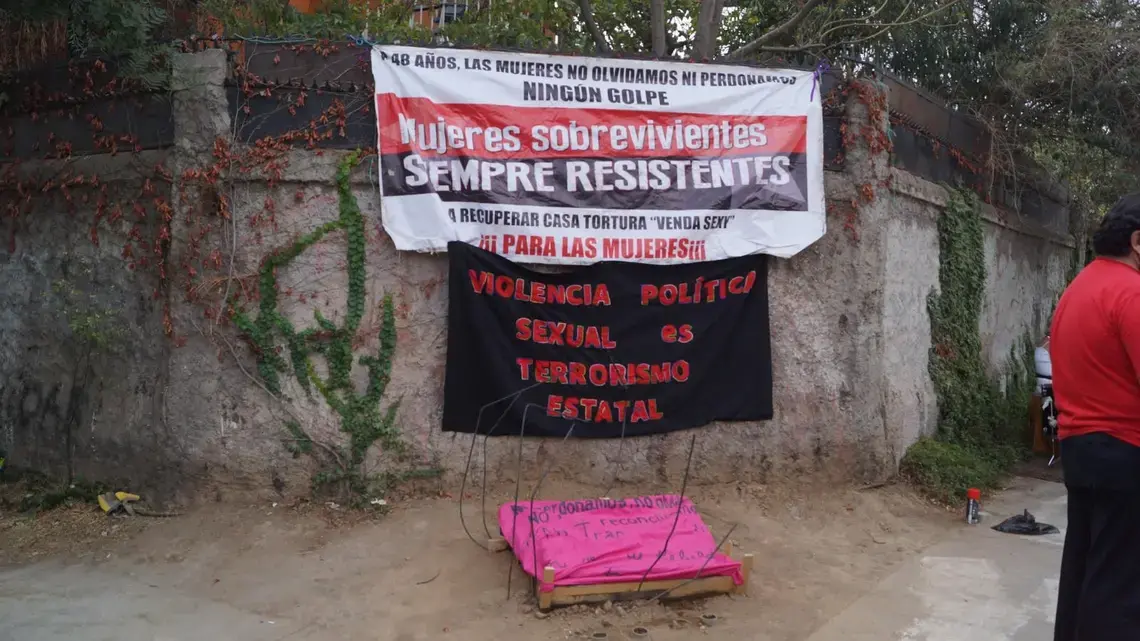
At the corner of a seemingly inconspicuous two-story house in Santiago, Chile, a group of women, from 20 to 70 years old, gathered to install a mosaic plaque. It was March 6, 2022––two days before International Women’s Day. The plaque bore the black-and-white portraits of five of at least 85 young women detained at the house and subjected to sexual violence before being executed by Chilean armed forces between 1974 and 1977.
During those years, Augusto Pinochet governed Chile via a repressive military dictatorship, which claimed an estimated 40,000 victims. The house in Santiago was known during this period as Venda Sexy, a name that crudely alludes to the sexual violence that agents of Chile’s secret police committed inside it against arbitrarily detained citizens, most of them women.
Among the women gathered at Venda Sexy on March 6 was Beatriz Bataszew Contreras, 66, a Chilean survivor of Venda Sexy who now describes herself as an “autonomous feminist.” To her and Victoria Aldunate––at 60, another autonomous feminist and survivor of torture under the dictatorship––this broadly used and hotly contested term means not belonging to, receiving money from, or collaborating with any political party or state-affiliated organization.
March 6 was not the first time Bataszew had returned to Venda Sexy. She and other autonomous feminists have put up memorials at the house several times, each time with the intention of reclaiming the house as a site of memory. “We want this space to revindicate the people who were victimized by the Chilean state,” Bataszew says, before adding that these memorials are always eventually taken down––a concrete manifestation of how contentious it can be to memorialize the past in post-dictatorship states like Chile.
In addition to memorializing the past, autonomous feminists like Bataszew protest sexual violence and gender inequality in the present. In fact, according to researchers, autonomous feminist movements are more successful at pushing gender equality to the forefront of national consciousness and influencing policy than are political parties, government agencies, and mixed-gender human rights organizations. By maintaining a distance from the state, autonomous feminists can position gender equality at the fore of all their actions without having to make compromises.
The word “autonomy” began to transcend Latin American feminism during the second wave of feminism in the 1970s and early 1980s. Many early feminists from this period belonged to leftist political parties, such as socialist parties; in due course, other feminists began to question whether political ideologies like socialism truly prioritized and sought to solve gender issues. Those who felt that party activism did not prioritize women’s issues enough created their own collectives, independent of political parties.
From 2004 to 2014, autonomous feminists organized public demonstrations and memorials––such as that at Venda Sexy––every month to commemorate the women whom Pinochet’s forces arbitrarily detained, disappeared, assassinated, and tortured.
They met resistance at each event. “Every time we repaired [our memorials], in only a few days they would destroy them,” Aldunate says of Chileans who opposed these commemorative events. In other instances, Carabineros [Chilean national police] would show up to the demonstrations, not to detain the feminists but “to instigate,” she says.
While these forms of resistance are visible and apparent, Aldunate says that “the majority of the resistance is a resistance of silence.” Their silence comes in neglecting to recognize the sexual violence and torture committed by the dictatorship and instead solely commemorating women whom state forces disappeared or assassinated. Aldunate describes how these Chileans “believe in the martyrdom of death, but never think about the importance of life and survival.” Aldunate estimates that the resistance makes up less than half of all Chileans––not the majority.
Autonomous feminists like Bataszew and Aldunate also oppose re-victimizing survivors of the dictatorship. “We disagree with being seen as ‘victims,’” Bataszew says. “We––those who fought against the dictatorship––had visions for the world, had political projects, wanted to radically change not just the Pinochet system, but the capitalist system.”
For her part, Bataszew joined the Movimiento de Izquierda Revolucionaria (MIR) at age 17. Throughout her life, Bataszew has been a socialist and has advocated for overthrowing Chile’s capitalist economy in favor of a socialist one. Although revolution is harder to come by than reform, Bataszew says: “I don’t fight for what can be done––I fight for what we want.”
Aldunate’s activism also began at a young age. Before the 1973 coup, her parents hosted meetings for leftist political parties in the family’s house, through which Aldunate developed a political consciousness. The day of the coup, Aldunate was only 11 years old; her parents fled to Argentina, where she joined them one year later. In 1978, her family returned to Chile, where she joined the Juventud Comunista––a student communist group. During a public demonstration at age 17, Chilean national police detained and tortured Aldunate. After this, Aldunate went into exile in Europe for many years before returning to Chile and turning to autonomous feminism.
To be sure, not all feminists adopt Bataszew and Aldunate’s definition of autonomy. During the late 1980s, different feminist groups came to distinct understandings of what “autonomy” means. Some autonomous feminists began limited collaboration with political parties and state agencies, while others maintained complete independence. Both Bataszew and Aldunate point to 1990––the year of Chile’s transition to democracy––as the year that they broke off other human rights organizations into their own autonomous collectives.
Bettina Priotti, 74, is an autonomous feminist from La Plata, Argentina, who defines autonomy as “being able to function without external conditions.” Priotti believes that feminist organizations can therefore collaborate with the state while still maintaining autonomy. In fact, Priotti herself has worked at the La Plata-based Comisión Provincial por la Memoria––an autonomous but public organization under the Buenos Aires provincial government.
What Priotti, Bataszew, and Aldunate all have in common is how far their activism reaches into both the past and present. “This history is not past. This history is present,” Bataszew notes about sexual violence committed by Chilean state forces, which she and Aldunate say continues to this day in Chile. As for how Bataszew and other autonomous feminists want this history to be remembered: “We do not want a neutral memory. We want a rebellious memory.”










